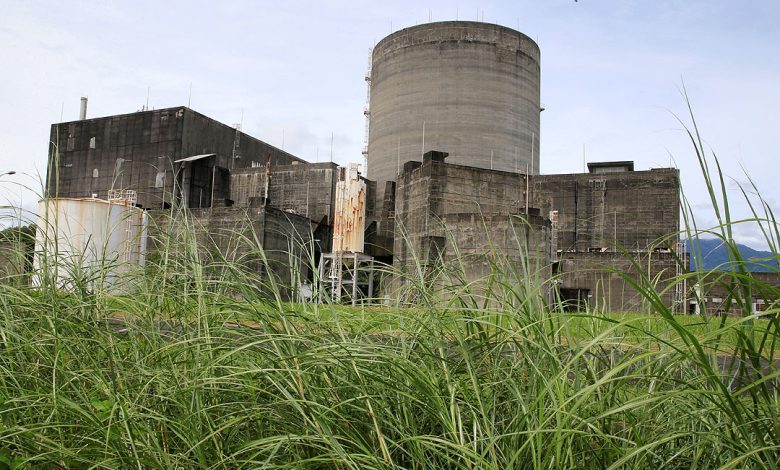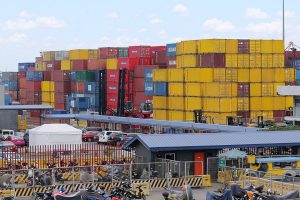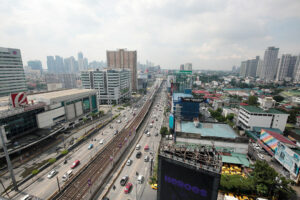Duterte seeks to revive nuclear power

The Bataan Nuclear Power Plant (BNPP) is seen in Morong town, Bataan province, Philippines, Sept. 16, 2016. — REUTERS/ROMEO RANOCO
By Kyle Aristophere T. Atienza, Reporter
PHILIPPINE President Rodrigo R. Duterte has signed an executive order allowing the country to tap nuclear power as an alternative energy source, more than a year after an interagency body submitted its recommendation.
“The National Government commits to the introduction of nuclear power energy into the state’s energy mix,” Mr. Duterte said in Executive Order (EO) No. 164.
The order was signed on Feb. 28, three months before Mr. Duterte steps down from office.
The President said he looked into the economic, political, social and environmental aspects in reviving the country’s nuclear power program.
“For the country to achieve its sustained growth targets, it must ensure that it has a reliable, secure, sustainable, quality and affordable electricity supply, including sufficient reserve to guarantee that there will be no disruptions in power supply,” he said.
Mr. Duterte said nuclear power should be tapped as a “viable baseload power source” alongside renewable energy, in order to address the projected decline of coal-fired power plants.
In 2020, the Philippines’ power mix consisted of 57% coal, 21% renewable energy, 19% natural gas, and 2% oil-based.
The EO also directed the Department of Energy to conduct a pre-feasibility study on the viability of introducing nuclear power.
The Nuclear Energy Program Inter-Agency Committee (NEP-IAC) was also tasked to make recommendations on the use and viability of the mothballed Bataan Nuclear Power Plant (BNPP) and the establishment of other facilities for the utilization of nuclear energy.
The $2.2-billion BNPP was completed in 1984 but mothballed in 1986 after the ouster of dictator Ferdinand Marcos, Sr. His son, Ferdinand Jr., is currently running for president.
Energy Secretary Alfonso G. Cusi has endorsed the use of nuclear power, claiming it is safe and will help the Philippines achieve energy security.
“Nuclear power is cheaper and more consistent than other energy sources,” Caloy A. Arcilla, director of the Department of Science and Technology-Philippine Nuclear Research Institute, said in a Viber message.
LEGISLATION NEEDEDEnergy Undersecretary Gerardo D. Erguiza, Jr. said the government needs to come up with a regulatory framework for the nuclear energy program, which will require legislation.
It will also be up to the next administration if it will support the nuclear energy program, Mr. Erguiza added.
“2027 is the earliest possible [time when we can build a traditional] nuclear power plant,” he said during a virtual press conference on Wednesday.
He said that those nuclear power plants with small modular reactors, which are being eyed in off-grid areas, can be built as soon as the regulatory framework is already in place.
Sixteen areas are being considered as possible locations for nuclear power plants, 13 of which have been on the list since 1980s.
These areas are located in Bataan, Batangas, Cagayan, Negros Occidental, Zamboanga del Norte, Quezon, General Santos City, and Sulu.
“These areas are considered because they are isolated, the availability of the cooling system, basically based on the general standards, but again, there is a process,” Mr. Erguiza said.
SAFETY CONCERNSCivic groups have been opposing the possible use of nuclear energy in the country, citing environmental and safety concerns.
Antonio Gabriel M. La Viña, a climate justice advocate, said the government has yet to convince the public that safety issues about nuclear plants “can be properly addressed.”
“I think Bataan is a nonstarter because of its location and the sheer density of people in Central Luzon,” he said in a Telegram message.
In a statement, environmental group Greenpeace urged the government to revoke the order, saying it is a “blatant disregard” of the public’s call for a concrete, sustainable, and safe solution to the energy crisis through renewable energy.
“Nuclear is the most dangerous and most expensive source of electricity and is the last thing the Filipino people need at a time when we are already deep in debt and trying to recover from a major health crisis,” it said.
Greenpeace said the next administration should ensure that its first order of business is to scrap the order. “The next administration will already inherit a huge debt burden and the pursuit of nuclear will make this even heavier due to steep capital costs for construction, operation of nuclear plants, enormous costs of radioactive fuel storage, and costs for managing a nuclear incident that can reach billions of dollars, as well as price volatility as almost all sources of uranium are in conflict areas.”
The group said it’s “unfortunate” that the order came right after the release of a report by the United Nations-led Intergovernmental Panel on Climate Change, which highlighted the need for nature-based solutions and strong political commitment to address the climate crisis. — with Marielle C. Lucenio




